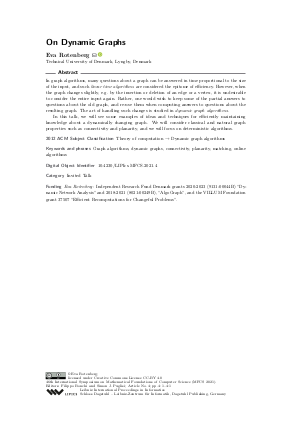On Dynamic Graphs (Invited Talk)
Author
Eva Rotenberg 
-
Part of:
Volume:
46th International Symposium on Mathematical Foundations of Computer Science (MFCS 2021)
Part of: Series: Leibniz International Proceedings in Informatics (LIPIcs)
Part of: Conference: Mathematical Foundations of Computer Science (MFCS) - License:
 Creative Commons Attribution 4.0 International license
Creative Commons Attribution 4.0 International license
- Publication Date: 2021-08-18
File

PDF
LIPIcs.MFCS.2021.4.pdf
- Filesize: 336 kB
- 1 pages
Document Identifiers
Subject Classification
ACM Subject Classification
- Theory of computation → Dynamic graph algorithms
Keywords
- Graph algorithms
- dynamic graphs
- connectivity
- planarity
- matching
- online algorithms
Metrics
- Access Statistics
-
Total Accesses (updated on a weekly basis)
0Document
0Metadata
Abstract
In graph algorithms, many questions about a graph can be answered in time proportional to the size of the input, and such linear time algorithms are considered the epitome of efficiency. However, when the graph changes slightly, e.g. by the insertion or deletion of an edge or a vertex, it is undesirable to consider the entire input again. Rather, one would wish to keep some of the partial answers to questions about the old graph, and re-use them when computing answers to questions about the resulting graph. The art of handling such changes is studied in dynamic graph algorithms. In this talk, we will see some examples of ideas and techniques for efficiently maintaining knowledge about a dynamically changing graph. We will consider classical and natural graph properties such as connectivity and planarity, and we will focus on deterministic algorithms.
Cite As Get BibTex
Eva Rotenberg. On Dynamic Graphs (Invited Talk). In 46th International Symposium on Mathematical Foundations of Computer Science (MFCS 2021). Leibniz International Proceedings in Informatics (LIPIcs), Volume 202, p. 4:1, Schloss Dagstuhl – Leibniz-Zentrum für Informatik (2021)
https://doi.org/10.4230/LIPIcs.MFCS.2021.4
BibTex
@InProceedings{rotenberg:LIPIcs.MFCS.2021.4,
author = {Rotenberg, Eva},
title = {{On Dynamic Graphs}},
booktitle = {46th International Symposium on Mathematical Foundations of Computer Science (MFCS 2021)},
pages = {4:1--4:1},
series = {Leibniz International Proceedings in Informatics (LIPIcs)},
ISBN = {978-3-95977-201-3},
ISSN = {1868-8969},
year = {2021},
volume = {202},
editor = {Bonchi, Filippo and Puglisi, Simon J.},
publisher = {Schloss Dagstuhl -- Leibniz-Zentrum f{\"u}r Informatik},
address = {Dagstuhl, Germany},
URL = {https://drops.dagstuhl.de/entities/document/10.4230/LIPIcs.MFCS.2021.4},
URN = {urn:nbn:de:0030-drops-144445},
doi = {10.4230/LIPIcs.MFCS.2021.4},
annote = {Keywords: Graph algorithms, dynamic graphs, connectivity, planarity, matching, online algorithms}
}
Author Details
Funding
- Rotenberg, Eva: Independent Research Fund Denmark grants 2020-2023 (9131-00044B) "Dynamic Network Analysis" and 2018-2021 (8021-00249B), "AlgoGraph", and the VILLUM Foundation grant 37507 "Efficient Recomputations for Changeful Problems".
